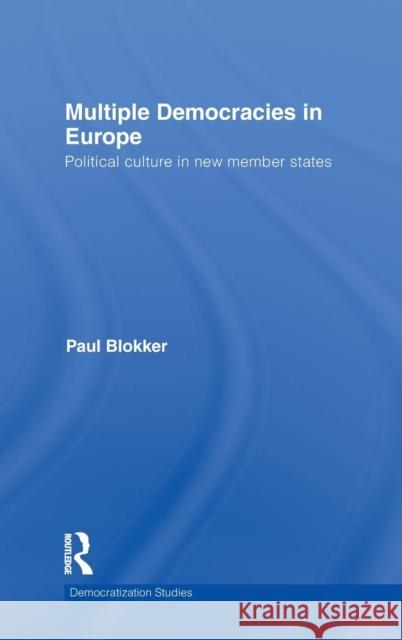Multiple Democracies in Europe: Political Culture in New Member States » książka
Multiple Democracies in Europe: Political Culture in New Member States
ISBN-13: 9780415492737 / Angielski / Twarda / 2009 / 224 str.
Multiple Democracies in Europe: Political Culture in New Member States
ISBN-13: 9780415492737 / Angielski / Twarda / 2009 / 224 str.
(netto: 791,35 VAT: 5%)
Najniższa cena z 30 dni: 730,42
ok. 16-18 dni roboczych.
Darmowa dostawa!
This book provides an in-depth discussion and analysis of democracy in Europe, with a focus on the new EU member states, and makes an important and original contribution to the debate on the future of European democracy. Author Paul Blokker seeks to provide a critical reconceptualization of the notion of democratic political culture by developing a 'multiple democracies' theoretical approach. He draws on debates in democratization theory and normative political theory, and presents a cultural-sociological approach for the analysis of democratization and democratic regimes. This approach emphasizes the historical and cultural embedment of democracy, identifies a potential variety of 'ethics of democracy' that underpin democratic political cultures, and points to the significance of democratic imagination in the interpretation and recombination of such ethics. The book explores the relevance of this approach by analysing multiple political cultures and their role in the emergence of democratic regimes in three new member states - Hungary, Poland, and Romania - providing a detailed description and analysis of political cultures by means of the analysis of constitutional politics, constitutional texts, and political elite discourses, and the identification of distinct politico-cultural elements that distinguish these societies from each other. It will be of interest to students and scholars of democracy, European studies, post-communist studies, political theory and comparative politics.
This book provides a detailed analysis of democracy in Europe, with a focus on the new member states, and makes an important and original contribution to the debate on the future of European democracy.
Blokker seeks to provide a critical reconceptualization of democratic political culture and develops a ‘multiple democracies’ theoretical approach. He draws on debates in democratization theory and normative political theory, and presents a cultural-sociological approach for the analysis of democratization and democratic regimes. This approach emphasizes the historical and cultural embedment of democracy and identifies a potential variety of ‘ethics of democracy’ that underpin democratic political cultures, and the possibility of democratic innovation on the basis of novel combinations of such ethics.
The book explores the relevance of this approach by analysing the dominant political cultures and their role in the emergence of democratic regimes in three countries in Hungary, Poland, and Romania, providing a detailed description and analysis of democratic political cultures in the three cases, and the identification of distinct politico-cultural elements that distinguish these societies from each other.
It will be of interest to students and scholars of democracy, European studies, post-communist studies, political theory and comparative politics.











